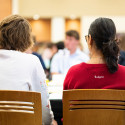Panel to discuss ‘The Nurture Assumption’
Faculty members who have devoted their careers to studying family will examine a controversial new book, “The Nurture Assumption: Why Children Turn Out the Way They Do,” in a panel discussion at UW–Madison Nov. 30.
The forum, titled “Do Parents Matter?” will begin at 4 p.m. in Room 272 of Bascom Hall. The public is invited to attend without charge.
“The Nurture Assumption” has drawn national attention, including stories in Time and Newsweek. Its author, Judith Rich Harris, argues that parents have little if any impact on how their children turn out. She says the two primary influences on children’s development are genetic inheritance and interaction with peers, or group socialization.
“Parenting has been oversold,” says Harris. “You have been led to believe that you have more of an influence on your child’s personality than you really do.”
The panel will include three members of the UW–Madison faculty who have devoted their research careers to assessing the impact of the family, plus a moderator who studies early cognitive development:
- Moderator James Dannemiller, professor of psychology. He has done research on the early development of visual attention and was recently appointed editor of the journal Developmental Psychology.
- Gary Sandefur, professor of sociology. He has focused on social structure and the family, and his publications include the book “Growing Up With a Single Parent: What Hurts? What Helps?”
- Deborah Lowe Vandell, professor of educational psychology. Her research has delineated the joint impact of family, child care, school and neighborhood on child development.
- Bradford Brown, professor of educational psychology. He has looked at the influence of teenage peer groups and peer pressure on school achievement and co- authored a book on “Why School Reform has Failed and What Parents Need to Do.”
“We are sponsoring this panel discussion,” says sociologist John DeLamater, “because ‘The Nurture Assumption’ has prompted public interest in an academic topic. Panel members will assess the author’s arguments and try to determine whether she has overgeneralized.”




